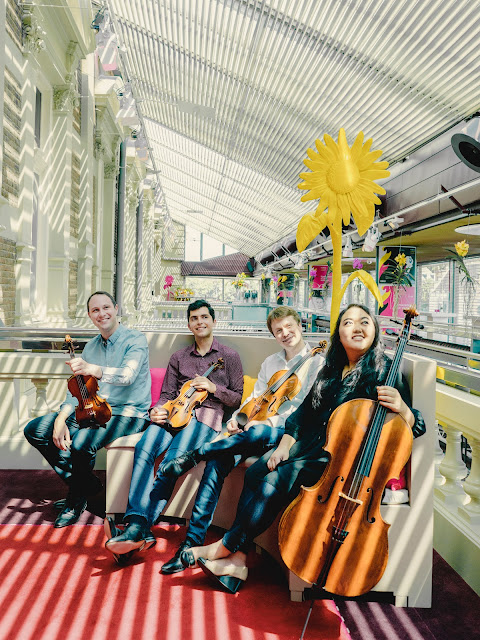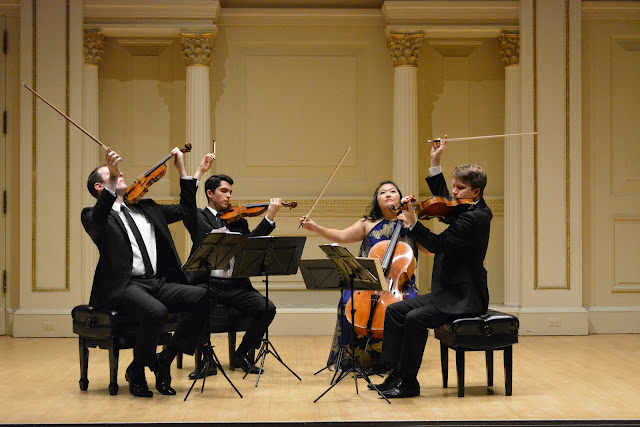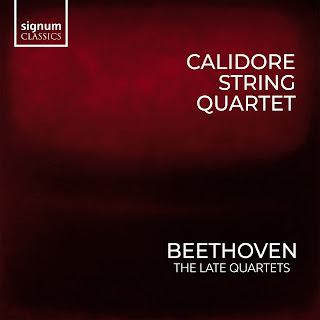 |
| Calidore String Quartet (Jeffrey Myers, Ryan Meehan, Jeremy Berry, Estelle Choi) |
The Calidore String Quartet is a young American string quartet who were at Wigmore Hall in November 2022, and who will be releasing their disc of late Beethoven quartets on Signum Records in February 2023, the first volume of a planned complete Beethoven cycle.
The Calidore String Quartet (Jeffrey Myers, Ryan Meehan, Jeremy Berry, Estelle Choi) was founded at the Colburn School in Los Angeles in 2010, and within two years, they won prizes in virtually all the major US chamber music competitions as well as at the 2012 ARD International Music Competition in Munich and the International Chamber Music Competition, Hamburg. The quartet was the first and only North American ensemble to win a Borletti-Buitoni Trust Fellowship, and they were BBC Radio 3 New Generation Artists from 2016 to 2018.
Whilst the Beethoven quartets have, of course, been recorded before the quartet feels that the works are special to them, and they have been performing them for the last 12 years. Beethoven very much set the standard and all 16 quartets are amazing; in fact, the recording project had been planned before the pandemic so the extra time enabled them to turbo-boost the project. All four players are excited to finally be able to get their recordings out there.
The quartet plays a significant amount of contemporary music with works by composers such as Kurtag, Jörg Widmann and Caroline Shaw. When I inquire whether this repertoire affects the way they look at Beethoven, their first response is 'everything affects everything', but then they point out that whilst their contemporary experience might affect how they look at Beethoven, music such as the Grosse Fuge still feels modern. And the mixture of old and new, certainly affects how they breathe and interact as a quartet.
For instance, after playing Widmann's complete Hunt Quartet, their sense of pulse and the way they interact is stronger after performing the music. But also, many composers have been influenced by Beethoven's quartets, so these works are often the foundation for more recent ones.
Music is their lifeblood, so new works allow their imagination freedom as there are no recordings to rely on. And this sense of freedom helps them when they perform music like Beethoven's quartets, music that is around a lot. It would be too easy for their performances to fall into a pre-existing category, and the freedom that comes from playing new music helps them not to fall into this trap. So, their performances are a creative relationship between new and old.
New music also helps bring a new perspective to Beethoven's music, society changes but human emotions behind the quartets remain constant, we just see them with a new lens. There are very few composers who can capture the spectrum of the human condition so viscerally as Beethoven. There is something for everyone in the quartets, and each piece is its own gem, all are distinct and different from each other. Presenting just the Beethoven quartets gives you a very complete experience.
 |
| The Calidore String Quartet's Carnegie Hall debut in 2016 (Photo: Michael Hershkowitz) |
They perform one, two or maybe three new commissions per year, though whether these new works stay in their repertoire depends both on audience reaction and how the quartet's members feel about the music. Their programmes are generally like a meal, with different courses, mixing contemporary, Classical, Romantic and earlier music. In the USA, there seems to be currently a big push to create new music and there is seemingly a lot of funding for new works. A few of the new works they have premiered in the USA have been requested subsequently for European concerts, and they cite the example of Caroline Shaw whose work they started performing in 2016.
Formed in 2010, all the members of the quartet met at the Colburn School in Los Angeles. Estelle and Jeffery started playing chamber music together at the school and wanted to continue. First Jeremy joined them and then Ryan. Having all gone to the same school, they feel that they all have a similar philosophy, standards, work ethic and expectations. And this leads to a more cohesive sense of music making.
How much dialogue there is in rehearsal depends on the situation; it is always changing but they are always open to communication and coming to a consensus. Sometimes it is a case of just playing the music and at other times they explore all the possibilities available to them. They try to try every idea, no matter what the initial reaction, rehearsing in detail and then giving themselves space for it to digest. Earlier on in their career, they had to be more structured, but now they are able to leave more to the telepathy on stage, to benefit from what time has done to deepen their relationship.
They are currently in residence at the University of Delaware, where they teach both chamber music and individually. So, the bulk of their time is spent as a quartet, but sometimes have the excitement of projects on their own. Financially, of course, such a life is financially tricky and in their early days, they were lucky to be supported by the Colburn School, to enable them to concentrate on performing together as a quartet.
By training the quartet is North American (three of the players are from the USA and one, Estelle, is from Canada), but they have studied with a wide variety of quartets in Europe, with differing but unique styles. This was useful in developing the players' empathy, and they have studied Beethoven with most of their mentor groups. They feel that their style is mid-Atlantic, combining the traditions from Europe and mid-20th-century America.
.JPG) |
| Calidore String Quartet |
Once the Beethoven recording project is completed, future recording projects will probably return to more concert-style discs with a mix of works, but they feel that Beethoven's quartets need to be presented by themselves. But another composer whose complete quartets they have their eye on is Bartok. If Beethoven's quartets are the Everest of quartet playing, they describe Bartok's as the K2, not quite as tall (there are six mature Bartok quartets) but harder. The six Bartok quartets are also a great representative of his career arc, moving from the romantic first quartet, the stereotypical middle-period quartets and the remarkable last quartet. The quartet feels that for Bartok's quartets, it is important to keep the group together as the individual quartets play off one another. Also, there is something about immersing yourself in a composer that gives a more satisfying result on disc.
They point out that we now live in an era where people digest music differently than their forbears, cherry-picking pieces and movements. They feel that it is interesting to present a product that encourages people to sit down and listen. To create a programme with interesting links, to encourage people to test their attention span. So, they will be balancing single composers with mixed programmes. Previous discs for Signum have included Resilience featuring quartets by Janáček, Prokofiev, Osvaldo Golijov and Mendelssohn, and Babel, featuring quartets by Schumann, Shostakovich and Caroline Shaw.
When we spoke, just before Christmas, the quartet had recorded all the Beethoven quartets except for one short session. The quartets are being released in reverse chronological order with the late quartets in early 2023 right through to 2025. Looking ahead, they have only recorded a little of their contemporary repertoire and so hope to record more. They have been playing a lot of Brahms including the Piano Quintet, so that is in the air too, but they are spoiled for choice as there is an endless supply of what they want to record.
When playing works like Brahms' Piano Quintet they are collaborating with other artists. This is a very powerful thing and can bring a fresh perspective, a healthily eye-opening experience that can affect not only the piece they are working on but other repertoires as well. In September 2022, they performed at Carnegie Hall with violinist Anne-Sophie Mutter, in a memorial concert for Andre Previn. They also enjoy collaborations this season with the Emerson Quartet, clarinettist Anthony McGill, bassist Xavier Foley, violist Matthew Lipman, harpist Bridget Kibbey and pianist Ivo Kahanek.
The Beethoven quartets have been such a colossal project, that it is only now that they can really think about what they might record next. They are thrilled that the Beethoven discs are coming out, but they also need to start planning.
The Calidore String Quartet's Beethoven Quartets, Vol. 1: Late String Quartets is released on Signum Records on 3 February 2023, SIGCD733
Never miss out on future posts by following us
The blog is free, but I'd be delighted if you were to show your appreciation by buying me a coffee.
Elsewhere on this blog
- Other Love Songs: The songs of Stephen Hough at Wigmore Hall with James Newby, Nicky Spence, Jess Dandy, Ailish Tynan - concert review
- The Hills Are Alive with the Sound of Muzak - New Year in Salzburg - concert review
- Bach and Caldara: The Dunedin Consort's New Year's Eve concert at Wigmore Hall - concert review
- 2022 in Record reviews - record review
- 2022 in Concert reviews - concert review
- 2022 in Opera and Music Theatre reviews - opera review
- Music for a video game must serve the players' actions: Olivier Deriviere talks about writing music for A Plague Tale: Requiem - interview
- O splendor gloriae: The Tallis Scholars at St John's Smith Square Christmas Festival - concert review
- A daring and refreshing project: 12 composers, 12 different approaches - Carols after a Plague from The Crossing - record review
- In fine fettle: conductor Maxim Emelyanychev brings an interesting element of period style to the latest Magic Flute revival at Covent Garden - opera review
- Natalya Romaniw, Freddie De Tommaso, & Erwin Schrott in Puccini's Tosca at Covent Garden - opera review
- A lovely way to begin the Christmas season: Handel's Messiah from Laurence Cummings & Academy of Ancient Music at Barbican Centre - concert review
- Home


No comments:
Post a Comment